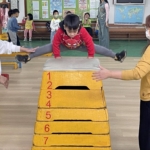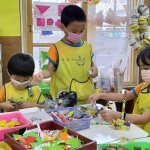2. Parents do not overly interfere with or manipulate their children's interactions with playmates.
The principle of minimal involvement should be applied. For example, if your child's interpersonal development is generally fine, you don't need to organize many activities. Similarly, what should your child play with his or her playmates? How to play? Or what to do if there are arguments or problems? Unless necessary, parents should encourage their children to communicate with their playmates and make decisions.
3. Arrange for same-age playgroup experiences and mixed-age playgroups.
In the past, children used to have older family members to bring up the younger ones, and there were neighborhood brothers and sisters to follow them when they went out, but now that fewer children are born, mixed-age playmates have become more important.
Yang Liyong observed that if children are allowed to choose playgroups, they are more likely to choose those of the same age, and rarely choose to be with younger children; therefore, parents need to help their children create mixed-age interactive experiences. For example, by arranging volunteer service activities for older children, children can learn how to take care of and help others in the group.
Friendship begins at home.
Children spend a large percentage of their time in school, and peer relationships are the center of their lives, but most students are concerned with grades, and teachers don't value how they get along with each other. Children need opportunities to spend time with playmates outside of school.
What can parents do to help their children meet or maintain playmates? According to Michelle Boba, one of America's leading parenting experts, "One of the best ways to do this is to have activities at home on a regular basis." Inviting your child's playmates to your home is a great opportunity to get to know your child's playmates as well as each other's parents, and it's a great way to observe your child's interactions with playmates, so that parents will know how to help their child improve his or her social skills.
There are several ways to help your child find a playmate:
1. Create a family free play (free play) field "the atmosphere is most important, the child feels safe and trust, free play will begin." Experienced mom Mei-Ling Lin says that children are happy when they can be with other children and don't care much about anything else. All she has to do is not to let seven or eight kids get out of control and get into danger, and to prepare some snacks and drinks. Also, at the beginning of the first home environment to introduce a little, tell the children how to dispose of garbage, used dishes to receive the sink and so on.
2. Organize inter-family parent-child movie appreciation sessions
The "Parent-Child Movie Appreciation Party" is another kind of playful and interactive space created by several mothers, including Hu Hui-Mei and Chen Yi-Juan, for their Primary 4 children who go to the same school at home. Every Friday night at Chen Yijuan's home, a laptop computer, a projector, a blank wall, and a few simple facilities turn the small living room into a large space for the children to exchange their feelings and opinions.
3. Organization of play groups
By joining a play group, Wu's two daughters have grown up with a more regular group of friends to play with.
Playgroups are more organized, especially for preschoolers. The group rotates to each member's home, with the mom of the house taking turns designing and leading the activities. Storytelling, playing arts and crafts, making cookies, singing and performing, "the closer the game is to the child's life experience, the more hands-on the child can be, and the more the child will love it".
4. Going out into nature with a partner
Lai and her son joined the Wilderness Preservation Society's Dazzling Bee Troupe more than a year ago. "We are like a big family, and our son has gained more experience in living with mixed-age peers and has made many friends.
"Playing in nature" is a way for Lai to increase her children's opportunities to be with other children from a young age. She says that nature is a good source of nourishment, and that people are more open-minded in nature, and that children's interactions are more open-minded.
Author Yvonne Lam




